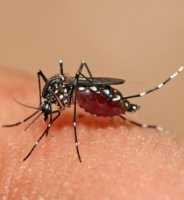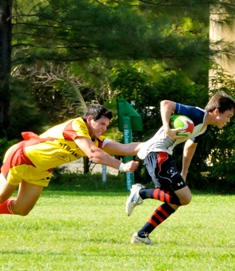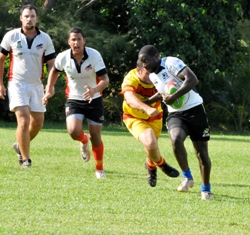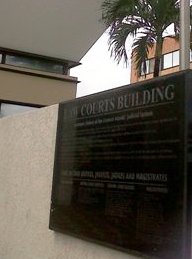Archive for October 4th, 2011

OT officials try out Cayman’s electronic tag system
 (CNS): A number of officials from other overseas territories recently visited the Cayman Islands to try out the tagging system currently used by the authorities here. Part of a fact finding project sponsored by the Foreign and Commonwealth Office, the four individuals wore the tags themselves and were monitored for 24 hours in order to assess the system’s capability. Tamia Richards, a Magistrate from the British Virgin Islands; Sgt Carl Mason from the Royal Virgin Islands Police Force; Ian Sargent, the Prison Superintendent from Turks & Caicos Islands; and Jocelyn Johnson, a Chief Probation Officer from Anguilla put themselves in the position of offenders.
(CNS): A number of officials from other overseas territories recently visited the Cayman Islands to try out the tagging system currently used by the authorities here. Part of a fact finding project sponsored by the Foreign and Commonwealth Office, the four individuals wore the tags themselves and were monitored for 24 hours in order to assess the system’s capability. Tamia Richards, a Magistrate from the British Virgin Islands; Sgt Carl Mason from the Royal Virgin Islands Police Force; Ian Sargent, the Prison Superintendent from Turks & Caicos Islands; and Jocelyn Johnson, a Chief Probation Officer from Anguilla put themselves in the position of offenders.
Steve Fradley, FCO Prison Reform Coordinator for the Overseas Territories, who coordinated the visit with assistance from Eric Bush from the Portfolio of Internal and External Affairs, said the visit allowed the officials from the other Overseas Territories to look at the Cayman experience of setting up electronic monitoring systeman for offenders.
“All those who came to Cayman have been extremely impressed with everything they have seen and the visit has served to improve links and working relationships between the various agencies in the criminal justice field. Pilot projects on electronic monitoring will now take place in various territories over the next few month," he said.
However, the system has not been without its problems as several offenders who have worn the tags in the past have been able to remove them. The most high profile was Harryington Rivers, who was shot in the middle of the night by a home owner after he managed to remove his tag and break into the house, while the authorities were unaware that he had removed his tag.

Beach residents clean up their own backyard
(CNS): Residents from the Frank Sound area on Grand Cayman managed to fill 27 bags of garbage in one week in an effort to clean up a one mile stretch of beach in their neighbourhood recently. Tired of the debris marring the sands in front of their home, Graham and Janet Morse took it upon themselves to clear up the mess. “Knowing that if everyone cleans up just a little bit there would be no garbage, we got together one week and worked a few hours every day picking up debris and garbage off the beach,” the Morses said.
While not part of the Department of Environment’s official duties, department staff didlend a hand as a token of their appreciation for the positive actions.
“Due to prevailing currents and winds, our beaches are unfortunately often inundated with junk. The only answer to this is regular neighbourhood clean-ups like the one in Frank Sound,” said Department of Environment’s Carl Edwards. “If everyone cleans a part, or doesn’t dump trash in the first place, it will make a huge difference. “And although they did get a little help from us, the moral of the story is that no-one needs to wait for government to clean-up. So next time if someone asks you who’s going to clean up the beach, or when is government going to do something, tell them to talk to Graham and Janet Morse,” he said.

Scouts to fly kites to raise cash
 (CNS): The local scout association is hoping to raise some cash and attract new recruits later this month with the resurrection the once popular Cayman pastime of kite-flying. The kite extravaganza will see prizes awarded for biggest and smallest kites, the first kite up; the highest flying and the best home-made kite. The family fun day and fundraiser for the association will take place on Saturday, 22 October at the Jay Bodden Marl Pit, on Sparky Drive, behind CUC from 10:00 a.m. to 2:00 p.m.
(CNS): The local scout association is hoping to raise some cash and attract new recruits later this month with the resurrection the once popular Cayman pastime of kite-flying. The kite extravaganza will see prizes awarded for biggest and smallest kites, the first kite up; the highest flying and the best home-made kite. The family fun day and fundraiser for the association will take place on Saturday, 22 October at the Jay Bodden Marl Pit, on Sparky Drive, behind CUC from 10:00 a.m. to 2:00 p.m.
“This is one of our important annual events that bring the scouting community together and I appeal to everyone to come out, enjoy a day of kiting and support the many boys and girls whose lives are being influenced in a positive way by scouting,” says Executive Commissioner of Scouts, Winston Hayle.
Annual registration of new and existing scouts will also take place at the event and parents are encouraged to bring their kids out to sign up as scouts.
The entry fee for kite flying is $10.00 and further information is available by calling 917-1506/ 939-8813/ 326-4518 or email ciscouts@candw.ky.
Teen arrested for murder
(CNS): Police made their first arrest in direct connection with one of last month's murders, following an operation in East End today (Tuesday 4 October). An RCIPS spokesperson confirmed that an 18-year-old man has been arrested and is currently in police custody in connection with the fatal shooting of Asher Williams McGaw. The body of the 21-year-old East End victim was found shot dead in John McLean Drive behind the local clinic by police officers on patrol in the early hours of Thursday, 22 September. McGaw, like the four other young men killed in gang violence during an eight day period last month, had received multiple gunshot wounds, including one to the head.
With one teen currently in custody, the police said enquiries into McGaw's murder continue. Although police arrested several known gang members in the wake of the five shootings under anti-gang legislation, this is the first arrest of a suspect in direct connection with one of the killings.
Police arestill investigating the murder of three men in West Bay — Robert Bush, Andrew Baptist and Preston Rivers — as well as the fatal shooting of Jason Christian in Crewe Road and the attempted murder of Keith Montague, who was also shot four times at the same time Christian was murdered but survived the shooting.
If anyone has any information which could assist the police in relation to this enquiry, or other gun related matters in the Cayman Islands, they should call the confidential tip-line 949-7777 or Crime Stoppers 800-8477 (TIPS).

One dengue fever case confirmed, says Public Health
 (CNS): The first dengue case reported in the Cayman Islands for 2011 has been confirmed by public health officials, who say it was most probably imported from the Bahamas by a returning resident. Last year there was a total of seven confirmed cases (two imported and five with no travel history). In 2008 and 2009 there were only two imported cases each year. So far this year, Caribbean countries have reported 47 confirmed dengue fever cases, with the Bahamas and Aruba having especially high incidence rates, according to Pan American Health Organisation (PAHO) statistics. More than 1000 cases with dengue like symptoms were reported in the Bahamas.
(CNS): The first dengue case reported in the Cayman Islands for 2011 has been confirmed by public health officials, who say it was most probably imported from the Bahamas by a returning resident. Last year there was a total of seven confirmed cases (two imported and five with no travel history). In 2008 and 2009 there were only two imported cases each year. So far this year, Caribbean countries have reported 47 confirmed dengue fever cases, with the Bahamas and Aruba having especially high incidence rates, according to Pan American Health Organisation (PAHO) statistics. More than 1000 cases with dengue like symptoms were reported in the Bahamas.
“With the current rash of cases in the region, medical personnel are on high alert to look for any local cases,” Medical Officer of Health Dr Kiran Kumar said.
In this regard, the Public Health Department has already issueda travel advisory two weeks ago (22 September) as part of its heightened surveillance for local presence of the disease.
“While dengue fever is not endemic to the Cayman Islands, as there is no sustained transmission of the disease, it is always wise to avoid mosquito bites by covering up at sunrise and sunset when the dengue carrier, the aedes aegyptii mosquito is the most active,” noted Dr Kumar. “While we need to be alert, and take preventative measures, we need not be alarmed of one case. For aedes mosquito to transmit dengue, they must bite infected persons, otherwise they can’t,” he emphasized.
He also reminded the public that they can help reduce the aedes aegyptii population locally, by clearing yards of containers that can hold water, as these are favourite breeding sites.
Most people recover without any complications, using pain relievers and bed rest. Once a patient has developed a fever, the infectious period lasts for one week only. Dengue symptoms include: high fever, severe headache, backache, joint and eye pain, nausea and vomiting, and rash.
Countries in our region who reported having dengue and dengue hemorrhagic fever are: Argentina, Bahamas, Barbados, Belize, Bolivia, Brazil, Columbia, Costa Rica, Cuba, Dominican Republic, El Salvador, French Guiana, Guadeloupe, Honduras, Jamaica, Mexico, Peru, Puerto Rico, Trinidad and Tobago, and Venezuela.
For more advice on mosquito control, contact MRCU on 949-2557 in Grand Cayman, or 948-2223 on Cayman Brac; and DEH on 949-6696 in Grand Cayman, or 948-2321 in Cayman Brac.

West Bay man stabbed brother in fight
(CNS): Police say a man was stabbed in West Bay last night and treated in hospital following a fight with his brother, who is now in police custody. Just before 10pm on Monday, 3 October, police received a report that two men were fighting in Tulip Close, West Bay, and that one of them had been stabbed during the altercation and sustained injuries to his arm. The injured man was taken to the Cayman Islands Hospital, George Town, and was released following treatment. A 29-year-old man has been arrested on suspicion of Assault GBH, he remains in custody while enquiries continue, the RCIPS says.

Buccaneers wear the crown
 (CRFU ) The 3rd and final leg of the 2011 A.R. Scott 10’s tournament was played on 24 September at the South Sound Rugby ground with only 3 teams taking part. The John Doak Architecture Iguanas, well out of the running for a podium spot forfeited their matches for the day with injuries and off island absences taking their toll on the team. The Ecay Pigs Trotters, without fearless leader Doug Anderson leading from the safety of the touchline, succumbed to 3 straight defeats on the day and were therefore unable to mount a final attack on the Krys Global Buccaneers lead in the tournament standings – DHL Cayman Storm 7-14 Buccaneers. Photos Caroline Deegan
(CRFU ) The 3rd and final leg of the 2011 A.R. Scott 10’s tournament was played on 24 September at the South Sound Rugby ground with only 3 teams taking part. The John Doak Architecture Iguanas, well out of the running for a podium spot forfeited their matches for the day with injuries and off island absences taking their toll on the team. The Ecay Pigs Trotters, without fearless leader Doug Anderson leading from the safety of the touchline, succumbed to 3 straight defeats on the day and were therefore unable to mount a final attack on the Krys Global Buccaneers lead in the tournament standings – DHL Cayman Storm 7-14 Buccaneers. Photos Caroline Deegan
The Ecay Pigs Trotters, knowing that the clash against the Storm was a must win affair were subjected to a heavy loss at the hands of the men in yellow who were clearly unfazed by their loss earlier in the day. The Storm defense impressed most by only allowing in 1 try by the Trotters – Ecay Pigs Trotters 7-34 DHL Cayman Storm
 The final match up the day was not going to be the decider of the tournament but rather an opportunity for the 2 top ranked teams to leave their mark on what had been a fun and good natured competition. That said the Buccaneers took no chances and stamped their authority on the game early on. A late surge from the Pigs Trotters in the 2nd half made for a few nervy moments for the Buccaneers but the final result was never in doubt. – Krys Global Buccaneers 44-17 Ecay Pigs Trotters
The final match up the day was not going to be the decider of the tournament but rather an opportunity for the 2 top ranked teams to leave their mark on what had been a fun and good natured competition. That said the Buccaneers took no chances and stamped their authority on the game early on. A late surge from the Pigs Trotters in the 2nd half made for a few nervy moments for the Buccaneers but the final result was never in doubt. – Krys Global Buccaneers 44-17 Ecay Pigs Trotters
Final Standings…
Tournaments Placing Points
Buccaneers 3 1,1,1 45
Pigs Trotters 3 2,2,3 34
Cayman Storm 3 3,3,2 32
Iguanas 2 4,4,F 16

Miller, lone voice for rollover
 (CNS): The independent member for North Side is now the lone voice in the legislature that believes the country should hold on to the term limit policy. During the debate on Friday over the government’s immigration amendments Ezzard Miller was the only supporter of the rollover policy and the key employee system as he called for the enforcement of the existing immigration laws, which, he says, are not the cause of Cayman’s economic woes. Miller also objected to the ten year permits, saying they would lock up jobs from qualified local people. He said that he made no excuses for his public advocacy when it came to protecting Caymanians, with so many returning after studying overseas to find few opportunities open to them.
(CNS): The independent member for North Side is now the lone voice in the legislature that believes the country should hold on to the term limit policy. During the debate on Friday over the government’s immigration amendments Ezzard Miller was the only supporter of the rollover policy and the key employee system as he called for the enforcement of the existing immigration laws, which, he says, are not the cause of Cayman’s economic woes. Miller also objected to the ten year permits, saying they would lock up jobs from qualified local people. He said that he made no excuses for his public advocacy when it came to protecting Caymanians, with so many returning after studying overseas to find few opportunities open to them.
The independent member said that since he was elected to the Legislative Assembly, as a result of pressure from special interest groups, the immigration law had been amended several times and each time the government claimed it would help business but this had not proven to be the case.
He pointed out there had been only one application under government’s recent amendment to offer 25 year residency for high net worth individuals. Miller also said that since government issued the directive that everyone in the financial sector should get key employee, the board had recorded a more than 90% approval rate of key employee applications. The promised increase in business with every change to the immigration law had still not materialized and Miller emphasised his belief that immigration was not the cause of the economic problems the islands faced.
He said the idea that there would be a mass exodus was unfounded because when people are rolled over they are replaced, which is what would continue to happen if the law was properly enforced.
Miller said he understood that Cayman did not have enough people to meet its labour market demands and he had no sympathy for Caymanians that didn’t perform in the workplace, but his problem was those qualified and experienced Caymanians who were simply not given an opportunity in the first place.
In his experience, the North Side MLA said, employers sometimes go to significant lengths to avoid placing Caymanians in key roles and no matter what guidelines government puts in place to attempt to force them to employ locals, they find increasingly creative ways to circumvent those rules. He also lamented the amount of say government was allowing foreign firms to have over the country’s immigration policy, which would eventually lead to foreign nationals taking over the country.
“It won’t be long before second generation ethnic groups are sitting in here,” Miller said referring to the Legislative Assembly.
He stated that someone had to speak up for local qualified people who had gone oversea,s “as they have been told they should”, and gained professional qualifications and experience but when they come back they were persistently denied the opportunities available here. The ten year permit, he said, would make things worse, “locking locals out of high level positions” forever.
He spoke of anecdotal evidence that one firm which had hired a number of Caymanian secretaries recently in preparation to replace staff due to be rolled over had now let those Caymanians go after the news that rollover was to be suspended.

Coke retailer’s 12 year sentence cut on appeal
 (CNS): The chief justice has found that a prison sentence imposed on what he described as a “low level retailer” of drugs rather that a seasoned dealer was too severe and reduced the twelve year prison sentence to eight. Xavier Quincy Waldron was convicted in November last year of possession of cocaine with intent to supply by the chief magistrate. Although Chief Justice Anthony Smellie upheld the conviction in the Grand Court on Monday, the country’s top judge did reduce the sentence, which had been passed on Waldron based largely on the quantity of the drug found on him when he was arrested in the men’s restroom at a George Town bar in November 2008.
(CNS): The chief justice has found that a prison sentence imposed on what he described as a “low level retailer” of drugs rather that a seasoned dealer was too severe and reduced the twelve year prison sentence to eight. Xavier Quincy Waldron was convicted in November last year of possession of cocaine with intent to supply by the chief magistrate. Although Chief Justice Anthony Smellie upheld the conviction in the Grand Court on Monday, the country’s top judge did reduce the sentence, which had been passed on Waldron based largely on the quantity of the drug found on him when he was arrested in the men’s restroom at a George Town bar in November 2008.
When searched by a police officer under the Misuse of Drugs Law, Waldron was found to be carrying two packets of drugs — one containing a cream coloured rocklike substance and the other a white powder. He was arrested and when the drugs were later tested they were confirmed as being cocaine based. Waldron had admitted possession but denied supplying the drugs. Following a trial in Summary Court, when Waldron claimed that the almost 12 grams of cocaine were for his own use, even though he stated he was only an occasional user, he was found guilty by the magistrate.
At sentencing, based on the chief justice’s guidelines, Margaret Ramsey-Hale said the amount of the drug was significant and there was nothing to mitigate the circumstances after Waldron had been found guilty at trial. She also described the drug as “crack cocaine”, a more addictive form of the drug.
“The chief justice’s sentencing guidelines indicate a sentence of 10-12 years for dealing in 4 grams or more of cocaine base,” she said in her decision. “The defendant was found guilty after trial. Nothing mitigates the offence. The amount of crack cocaine involved is substantial.”
During the appeal against sentencing in the Grand Court before the chief justice, defence attorney Lucy Organ argued that the sentencing was excessive. Forensic analysis did not show the drug recovered from Waldron to be “crack” cocaine but “cocaine base”.
She also argued that while the chief magistrate found no mitigating circumstances, the evidence did not suggest that the appellant had got to the point of supplying drugs to anyone or made any financial profit. In addition, the evidence suggested the appellant was no more than a low level retailer, which should have attracted a lower sentence than one passed on a trafficker.
Although Waldron has previous convictions for ganja, Organ pointed out that he had none for cocaine or any other “hard” drug and the magistrate had chosen the highest tariff in the range of 10-12 years in the sentencing guidelines, even though the offending was not of the very worst kind of its type and so the “sentence was manifestly harsh and excessive” in the circumstances.
In his ruling the chief justice said Organ’s submissions carried some force and pointed out that the chief magistrate was guided by a literal construction of the sentencing guidelines, which do state that four grams or more of cocaine without mitigating features attract a tariff of 10-12 years. The “unduly heightened fears” that the drug might have been crack, taken together with the quantity may have influenced the magistrate to impose the sentence at the very upper end of the tariff.
“Given the circumstances, which do suggest that the appellant is not a seasoned dealer but at worse, a low level retailer, I consider that the sentence can properly be reduced to one of eight years imprisonment,” the chief justice ordered.
Organ’s attempts on her client’s behalf to have the conviction quashed failed as the chief Justice did not accept the argument that the magistrate should not have found her client guilty on intent to supply based purely on the evidence of quantity. The defence attorney argued that the crown had based its case entirely on the amount as there was no evidence of paraphernalia, cash, a drug dealing lifestyle, or how the drugs would be sold.
The chief justice said that the limited extent which the magistrate relied on her own knowledge of quantities of illicit drugs and their general use and consumption was permissible for the purpose of calling upon the appellant to explain why he had such a large amount of drugs. The CJ said that during the trial the magistrate had found that the quantity of drugs was inconsistent with personal use but she made no absolute finding based on that. He said the amount set against the absence of a credible explanation by the appellant was the basis for the magistrate’s findings, as he upheld the conviction.

Dangerous kids won’t be forced into classrooms
 (CNS): The education minister says parents do not need to worry that their children will be sitting next to anti-social or dangerous students in the classroom as a result of the closure of the Alternative Education Centre. Speaking about the recently announced changes in the Legislative Assembly on Friday, Rolston Anglin said that the school system’s most challenging students will still be in separate accommodation. He explained that children with emotional behaviour or social difficulties (EBSD) will now be supervised in behavioural units which have been established in each of the high school campuses, with the most difficult children going to the new therapeutic centre at Bonaventure.
(CNS): The education minister says parents do not need to worry that their children will be sitting next to anti-social or dangerous students in the classroom as a result of the closure of the Alternative Education Centre. Speaking about the recently announced changes in the Legislative Assembly on Friday, Rolston Anglin said that the school system’s most challenging students will still be in separate accommodation. He explained that children with emotional behaviour or social difficulties (EBSD) will now be supervised in behavioural units which have been established in each of the high school campuses, with the most difficult children going to the new therapeutic centre at Bonaventure.
He explained that, as a result of the failure of the AEC and the problems identified there by the Education Standards Assessment Unit’s school inspectors, the unit had been closed and the issue of troubled kids would now be dealt with differently.
The inspectors found that AEC was disconnected from the mainstream education system and teachers there didn’t know enough about the educational history of the students to give them appropriate work. This had led to a high rate of drop out from education altogether and very few students were integrated back into the mainstream education system, as was intended.
Anglin said the new approach would allow the least challenging EBSD students to integrate into mainstream education and “learning bridges” would help them pass exams or take up vocational training. He said in-school support for EBSD children had been enhanced with the employment of specialist teachers for the behavioural units at the high schools, along with targeted intervention programmes.
The minister revealed that an alternative education facility would remain during the transition period at the Cayman Islands Further Education Centre for students awaiting transfer to the therapeutic centre or in need of emergency placement outside the mainstream environment. The goal, the minister revealed, was to move away from the very separate unit for challenged students towards an approach that was about intervening earlier and handling the behavioural issues on the school campuses rather than excluding troubled youngsters.
He spoke about recommendations made by Yolande Forde in her comprehensive report regarding the causes of criminal behaviour in Cayman, published in 2006. Anglin said that she had pointed to the problems of a traditional punitive response to behavioural problems in school which did not address the cause of a student’s misbehaviour: “A punishment-centred approach is primarily reactive and myopic because it allows authorities to respond to the symptoms and outcomes while the causes of the misconduct frequently go unaddressed.”
Anglin said the change now represented a shift from a reactive response to bad behaviour to systematic approaches that deal with early identification, assessment and therapeutic intervention.
The minister told his legislative colleagues that the most difficult students would be attending residential therapy at the Bonaventure home, which will be accommodating ten of the public school system’s most challenging students by the middle of this month. The Youth Rehabilitation Centre, which will form part of the redeveloped residential accommodation and deal with young offenders, will open in January 2013.
The minister said that in general, exclusion from school can no longer been seen as part of the solution. As pointed out by Forde, the students in question are not someone else’s problem but belong to this community as they are the children at greatest risk of future involvement in crime.
“They are not going anywhere. They stay within the limited confines of this island and become the criminal element that places all of us at risk,” he said, echoing the warnings Forde made in her report. Illustrating the point, he added that five of the six victims in the shootings last month were former AEC students.
“The restructuring of AEC was long overdue,” he said, adding that for the first time the changes would see alternative education services strategically planned rather than reactive, aligned with the curriculum in the mainstream system, cost effective and accountable and focussed on therapy, intervention and reintegration.
Pre-disposing factors to criminality in the Cayman Islands by Yolande C. Forde